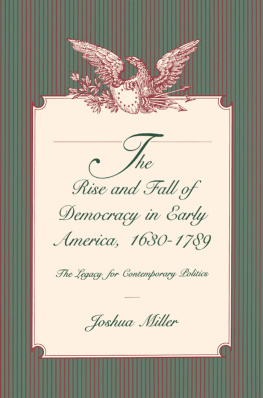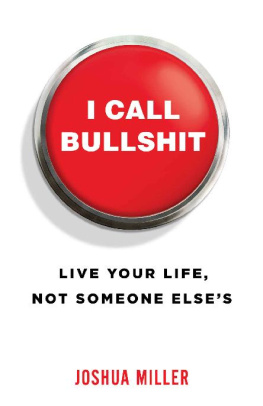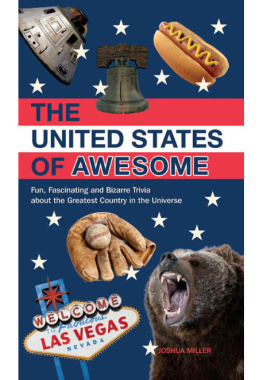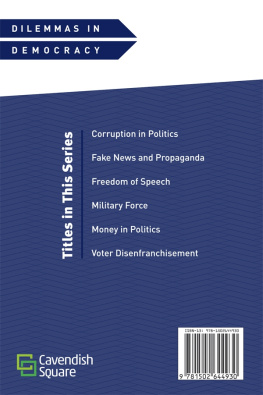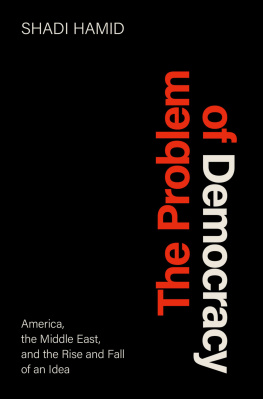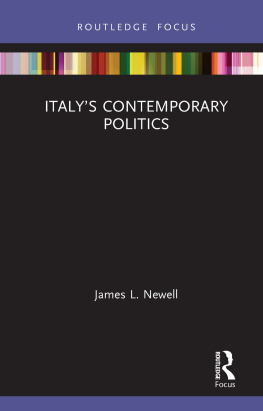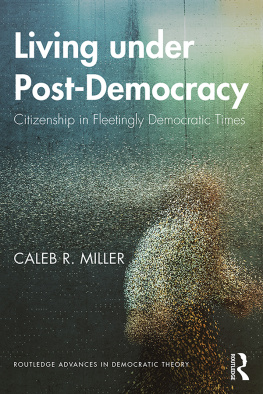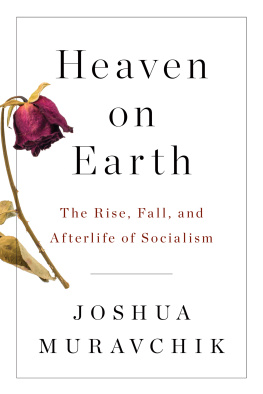Library of Congress
Cataloging-in-Publication Data
Miller, Joshua I.
The rise and fall of democracy in early America, 16301789 : the legacy for contemporary politics / Joshua I. Miller.
p. cm.
Includes bibliographical references and index.
ISBN 0-271-00744-3
1. United StatesPolitics and governmentColonial period, ca. 16001775.
2. United StatesPolitics and government17751783.
3. United StatesPolitics and government17831789.
4. Political cultureUnited StatesHistory.
5. DemocracyHistory.
I. Title. JK54.M55 1991
321.8'042'0973dc20 9046819
CIP
Copyright 1991
The Pennsylvania State University
All rights reserved
Printed in the United States of America
It is the policy of The Pennsylvania State University Press to use acid-free paper for the first printing of all clothbound books. Publications on uncoated stock satisfy the minimum requirements of American National Standard for Information SciencesPermanence of Paper for Printed Library Materials, ANSI Z39.481984.
This book would still be in a drawer if my friend Charles Hersch had not called me from California and asked to see it to help him prepare his lectures for a course on American Political Thought. After a perusal, he suggested that some larger portion of the public might want to read it. That had never occurred to me, and I am grateful to Chuck for the suggestion. Much of what is good in this book is due to his editorial work on it.
I want to thank my parents, not only for life itself and for love and support ever since, but also for serving as examples of the public life advocated by democratic theorists. They have lived lives of compassion, integrity, and extraordinary commitment to political ideals. My mother, Joyce, is a national leader of the trade union movement, and my father, Jay, is a career official with the American Civil Liberties Union. Although they will disagree with many of the political positions expressed herein, I think that we are ultimately on the same side, and I hope that I can still come over for dinner.
By the end of John Schaars second lecture on American Political Thought at the University of California, Santa Cruz, in 1973, I knew that I had found a new political philosophy. Only later did I realize that I had also found a mentor and a vocation. Professor Schaars eloquence, knowledge, wit, and humanity have inspired me since I met him. Schaar not only suggested the topic for this book but, especially in its early form, made many useful suggestions for revisions and additions.
After college, I wrote to Schaar from Jonesboro, Arkansas, where I was a community organizer, to ask his advice about graduate school. He recommended that I stick with public life for awhile rather than joining the academy, but if I insisted on going, then I should study with his friend Sheldon Wolin at Princeton. It was good advice.
Sheldon Wolin, now emeritus, was a great teacher of political theory, especially for graduate students. Every Wolin lecture was an intellectual event. Professor Wolin generously worked with me on my writing and thinking and articulated what was required of a graduate student and a scholar. Wolins standards are so high that I take a certain comfort in knowing that I can never meet them, although they continue to serve as standards.
Maurice Natanson, professor of philosophy at Yale, has been a cherished teacher since I took his courses on existentialism and phenomenology at UCSC. Natanson has served as a patient guide at each crossroad of the journey. He has been for me, and for many students, a model of a humane teacher committed to the life of the mind.
Wilson Carey McWilliams has also been a teacher and friend since I attended his great lectures on American Political Thought at Rutgers while I was a graduate student at Princeton. I am grateful to him for finding something of value in my work and being willing to tell others about it. He and Michael Lienesch were the scholarly reviewers of my manuscript for Penn State Press, and this book is much stronger for their criticisms and suggestions.
I thank Sanford G. Thatcher, director of Penn State Press, for his encouragement and graciousness. Jeffery Tulis, Aaron Bernstein, Seth Borgos, Wendy Brown, William Connolly, Jane Cullen, Sanford Kessler, Ernst Manasse, Nancy Schwartz, Peter Steinberger, Brian Weiner, and Eric Ziolkowski made helpful suggestions for revising the manuscript. Less direct but no less important aid and inspiration was provided by Ingrid Creppell, Marge Frantz, David Sachs, and Nicholas Xenos. I have appreciated the support of my colleagues and students at Lafayette College. Heather Kashner, a Charles A. Dana Research Assistant, provided crucial research aid and assisted in the preparation of the final manuscript.
originally appeared, in somewhat different form, in, respectively, The Journal of Politics (University of Texas Press) and Political Theory (Sage Publications). I am grateful to the publishers of those journals for permission to reprint the essays here.
As noted above, I had lots of help, but writing this book was largely solitary work, and I have tried to write it in a spirit of intellectual independence.
The rhetoric of acknowledgments requires a paean here to spouse and child. Lacking both, I want to offer thanks to my family and friends, to whom I owe nearly all happiness in life.
The Rise and Fall of Democracy In Early Amercia, 16301789
A mericans are deeply divided, among themselves and within themselves, on the subject of democracy. Democracy is sometimes taken to be Americas highest value, even its essence; but at other times, democracy is seen as Americas nightmare. Democracy is the New England town meeting; democracy is the sheriff of a small southern town. Much of what is worst in America has been imputed to direct democracy. Pure democracy, it is said, means the persecution of the minority by the majority. Democracy leads to, among other things, prayer in schools; the banning, labeling, or burning of books and records; and restrictions on alcohol, drugs, sex, and abortion. Above all, democracy has produced racial segregation and discrimination. Some people implicate democracy when the city council of Yonkers, New York, refuses to permit low-cost housing for blacks to be built in white neighborhoods.
On the other hand, most Americans retain an affection for the democratic ideal, even for its more radical elements. The image of people directly taking control of their lives in a town meeting still has positive connotations for many. We hate dictators, the domination of one country, or even one social group, by another, and censorship of speech and press. It is hardly controversial to say that adults should govern themselves and that government cannot be entrusted to experts.
The division over direct democracy has more than theoretical significance. Democratic themes are at the center of debates concerning abortion, affirmative action, welfare, and worker ownership and participation in decision making. In Tiananmen Square, Chinese students called for democracy, as did Solidarity in Poland and the reform movements in the Soviet Union. Centralized, hierarchical forms of government and economy in the United States, it is said, have undermined liberty; the power held now by the central government and the giant corporations should flow back to revived political communities. These new populists, direct democrats, or communitarians want to recover a form of politics where neighbors share power. They want ordinary people to be able to take control of their collective lives.


